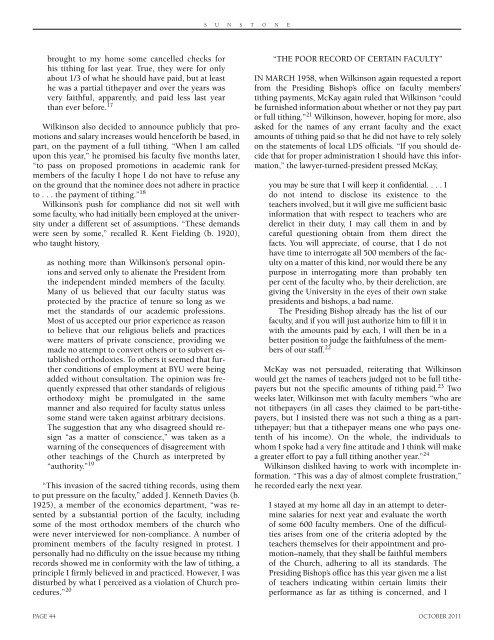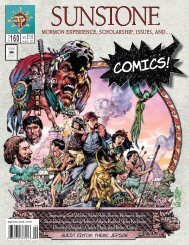Download Entire Issue PDF - Sunstone Magazine
Download Entire Issue PDF - Sunstone Magazine
Download Entire Issue PDF - Sunstone Magazine
You also want an ePaper? Increase the reach of your titles
YUMPU automatically turns print PDFs into web optimized ePapers that Google loves.
S U N S T O N E<br />
brought to my home some cancelled checks for<br />
his tithing for last year. True, they were for only<br />
about 1/3 of what he should have paid, but at least<br />
he was a partial tithepayer and over the years was<br />
very faithful, apparently, and paid less last year<br />
than ever before. 17<br />
Wilkinson also decided to announce publicly that promotions<br />
and salary increases would henceforth be based, in<br />
part, on the payment of a full tithing. “When I am called<br />
upon this year,” he promised his faculty five months later,<br />
“to pass on proposed promotions in academic rank for<br />
members of the faculty I hope I do not have to refuse any<br />
on the ground that the nominee does not adhere in practice<br />
to . . . the payment of tithing.” 18<br />
Wilkinson’s push for compliance did not sit well with<br />
some faculty, who had initially been employed at the university<br />
under a different set of assumptions. “These demands<br />
were seen by some,” recalled R. Kent Fielding (b. 1920),<br />
who taught history,<br />
as nothing more than Wilkinson’s personal opinions<br />
and served only to alienate the President from<br />
the independent minded members of the faculty.<br />
Many of us believed that our faculty status was<br />
protected by the practice of tenure so long as we<br />
met the standards of our academic professions.<br />
Most of us accepted our prior experience as reason<br />
to believe that our religious beliefs and practices<br />
were matters of private conscience, providing we<br />
made no attempt to convert others or to subvert established<br />
orthodoxies. To others it seemed that further<br />
conditions of employment at BYU were being<br />
added without consultation. The opinion was frequently<br />
expressed that other standards of religious<br />
orthodoxy might be promulgated in the same<br />
manner and also required for faculty status unless<br />
some stand were taken against arbitrary decisions.<br />
The suggestion that any who disagreed should resign<br />
“as a matter of conscience,” was taken as a<br />
warning of the consequences of disagreement with<br />
other teachings of the Church as interpreted by<br />
“authority.” 19<br />
“This invasion of the sacred tithing records, using them<br />
to put pressure on the faculty,” added J. Kenneth Davies (b.<br />
1925), a member of the economics department, “was resented<br />
by a substantial portion of the faculty, including<br />
some of the most orthodox members of the church who<br />
were never interviewed for non-compliance. A number of<br />
prominent members of the faculty resigned in protest. I<br />
personally had no difficulty on the issue because my tithing<br />
records showed me in conformity with the law of tithing, a<br />
principle I firmly believed in and practiced. However, I was<br />
disturbed by what I perceived as a violation of Church procedures.”<br />
20<br />
“THE POOR RECORD OF CERTAIN FACULTY”<br />
IN MARCH 1958, when Wilkinson again requested a report<br />
from the Presiding Bishop’s office on faculty members’<br />
tithing payments, McKay again ruled that Wilkinson “could<br />
be furnished information about whether or not they pay part<br />
or full tithing.” 21 Wilkinson, however, hoping for more, also<br />
asked for the names of any errant faculty and the exact<br />
amounts of tithing paid so that he did not have to rely solely<br />
on the statements of local LDS officials. “If you should decide<br />
that for proper administration I should have this information,”<br />
the lawyer-turned-president pressed McKay,<br />
you may be sure that I will keep it confidential. . . . I<br />
do not intend to disclose its existence to the<br />
teachers involved, but it will give me sufficient basic<br />
information that with respect to teachers who are<br />
derelict in their duty, I may call them in and by<br />
careful questioning obtain from them direct the<br />
facts. You will appreciate, of course, that I do not<br />
have time to interrogate all 500 members of the faculty<br />
on a matter of this kind, nor would there be any<br />
purpose in interrogating more than probably ten<br />
per cent of the faculty who, by their dereliction, are<br />
giving the University in the eyes of their own stake<br />
presidents and bishops, a bad name.<br />
The Presiding Bishop already has the list of our<br />
faculty, and if you will just authorize him to fill it in<br />
with the amounts paid by each, I will then be in a<br />
better position to judge the faithfulness of the members<br />
of our staff. 22<br />
McKay was not persuaded, reiterating that Wilkinson<br />
would get the names of teachers judged not to be full tithepayers<br />
but not the specific amounts of tithing paid. 23 Two<br />
weeks later, Wilkinson met with faculty members “who are<br />
not tithepayers (in all cases they claimed to be part-tithepayers,<br />
but I insisted there was not such a thing as a parttithepayer;<br />
but that a tithepayer means one who pays onetenth<br />
of his income). On the whole, the individuals to<br />
whom I spoke had a very fine attitude and I think will make<br />
a greater effort to pay a full tithing another year.” 24<br />
Wilkinson disliked having to work with incomplete information.<br />
“This was a day of almost complete frustration,”<br />
he recorded early the next year.<br />
I stayed at my home all day in an attempt to determine<br />
salaries for next year and evaluate the worth<br />
of some 600 faculty members. One of the difficulties<br />
arises from one of the criteria adopted by the<br />
teachers themselves for their appointment and promotion–namely,<br />
that they shall be faithful members<br />
of the Church, adhering to all its standards. The<br />
Presiding Bishop’s office has this year given me a list<br />
of teachers indicating within certain limits their<br />
performance as far as tithing is concerned, and I<br />
PAGE 44 OCTOBER 2011

















